-


Adjectival Phrases English Grammar Lesson
£1.00 Add to basket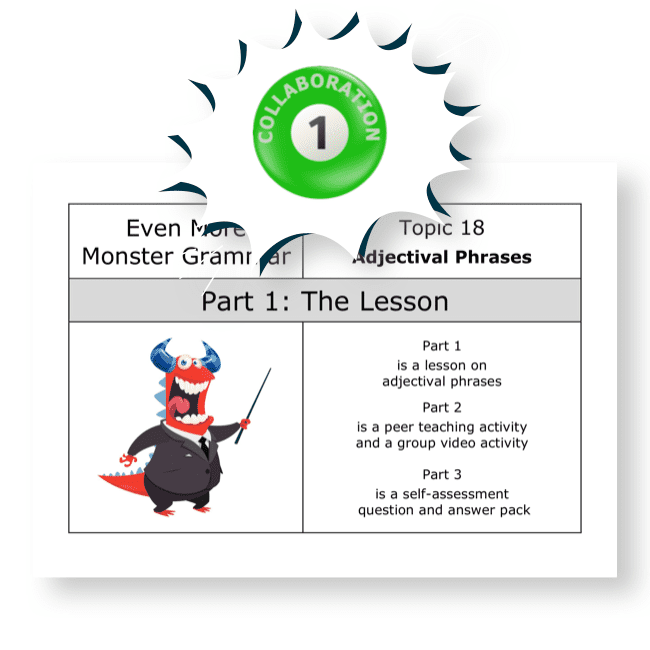 £1.00Add to basket
£1.00Add to basketIn this lesson pupils work with a partner to make some brief notes about Adjectival Phrases. Ideally, pupils should make a note of only the essential aspects of this topic – say 5-6 main points (with examples). These notes are important because they will be used as a basis for peer teaching and making a video on this topic in part 2. This lesson has been written to enable to enable pupils to teach themselves without teacher input because each page has been carefully designed to nudge pupils’ learning forward.
VIEW -


Adjectival Phrases Peer Teaching
£1.00 Add to basket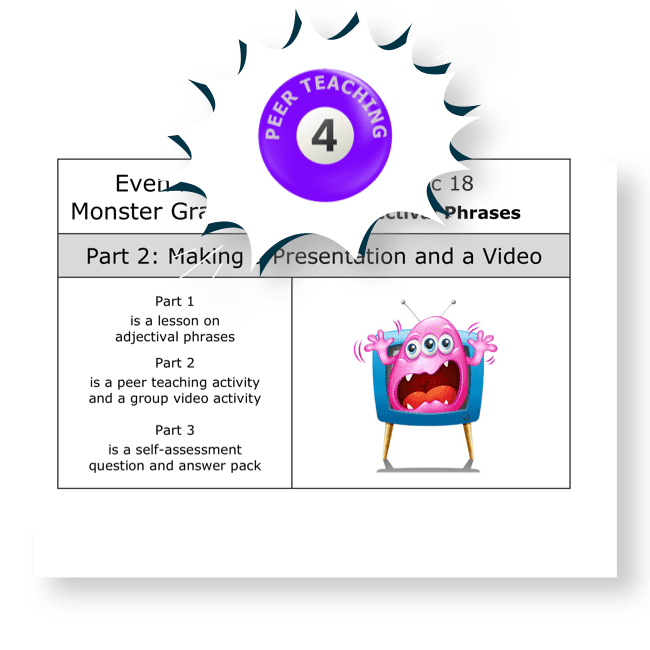 £1.00Add to basket
£1.00Add to basketWorking with a partner, pupils made brief notes on Adjectival Phrases in part 1. The same pair should now be ready to make a presentation on this topic to another pair. In return this other pair will also make a presentation (on the same topic) back to them. In this process, all four pupils experience peer teaching and being peer taught thereby creating four “experts”. There is a suggested page of notes included in this part for pupils to check their own notes against before they peer teach this topic to each other. These four experts then combine the best bits of both of their presentations to create a short video about Adjectival Phrases. This video will form part of a library of grammar topics to be shared among the class.
VIEW -


Adjectival Phrases Self-Assessment
£1.00 Add to basket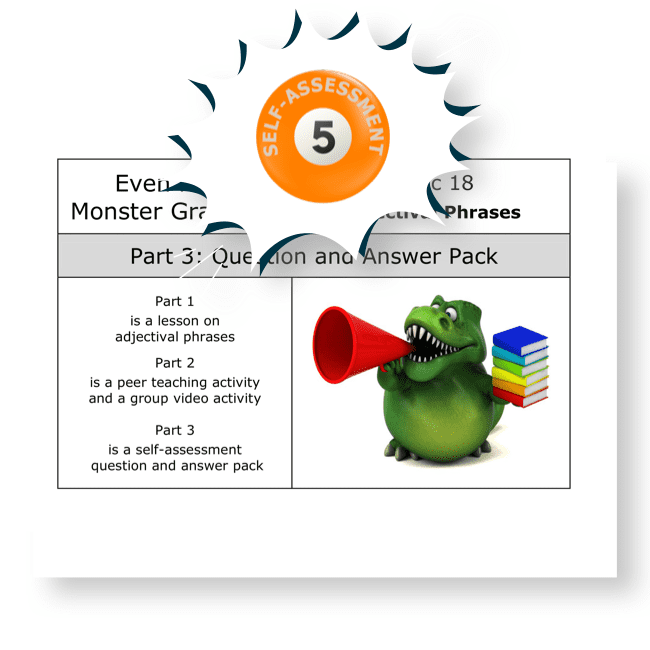 £1.00Add to basket
£1.00Add to basketHaving made notes with a partner (part 1) and experienced peer teaching (and peer learning) and making a video (part 2) in a group of four pupils should now be ready to work on their own. After answering the questions pupils then self-assess their work. The idea is to check that pupils’ individual understanding of Adjectival Phrases is secure. After completing this question and answer self-assessment unit pupils are in a position to see whether they are a purple monster (peer learner) or a green monster (peer teacher) of this topic. Purple monsters should be encouraged to watch videos on this topic.
VIEW -


Adjectives English Grammar Lesson
£1.00 Add to basket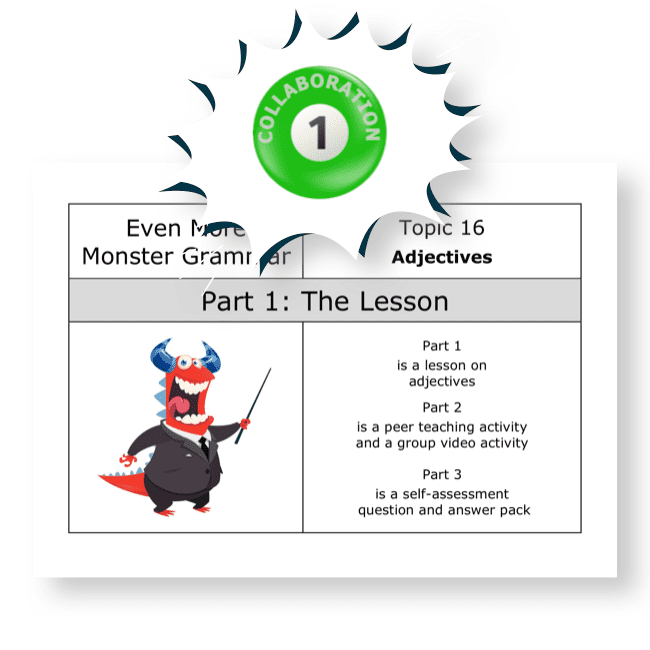 £1.00Add to basket
£1.00Add to basketAll our lessons are based on classroom practice that has been proven by research to work.
In this lesson, pupils work with a partner to make some brief notes about Adjectives. Ideally, pupils should make a note of only the essential aspects of this topic – say 5-6 main points (with examples). These notes are important because they will be used as a basis for peer teaching and making a video on this topic in part 2. This lesson has been written to enable pupils to teach themselves without teacher input because each page has been carefully designed to nudge learning forward.
VIEW -

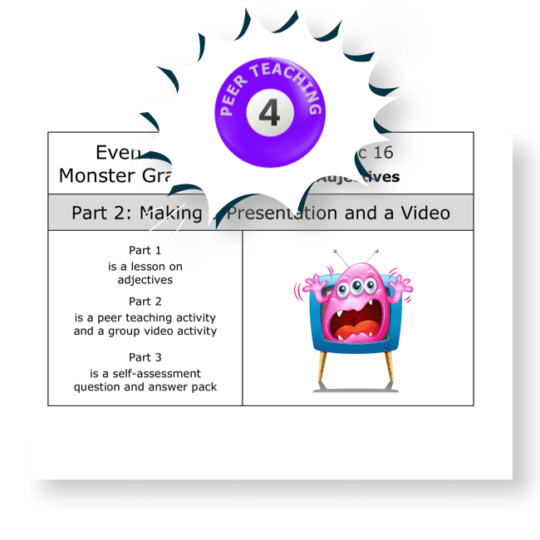
Adjectives Peer Teaching
£1.00 Add to basket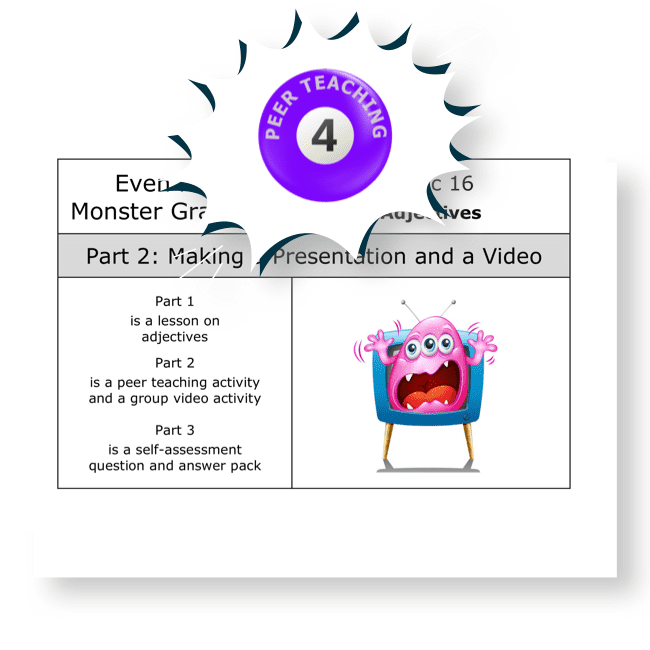 £1.00Add to basket
£1.00Add to basketWorking with a partner, pupils made brief notes on Adjectives in part 1. The same pair should now be ready to make a presentation on this topic to another pair. In return this other pair will also make a presentation (on the same topic) back to them. In this process, all four pupils experience peer teaching and being peer taught thereby creating four “experts”. There is a suggested page of notes included in this part for pupils to check their own notes against before they peer teach this topic to each other. These four experts then combine the best bits of both of their presentations to create a short video about Adjectives. This video will form part of a library of grammar topics to be shared among the class.
VIEW -


Adjectives Self-Assessment
£1.00 Add to basket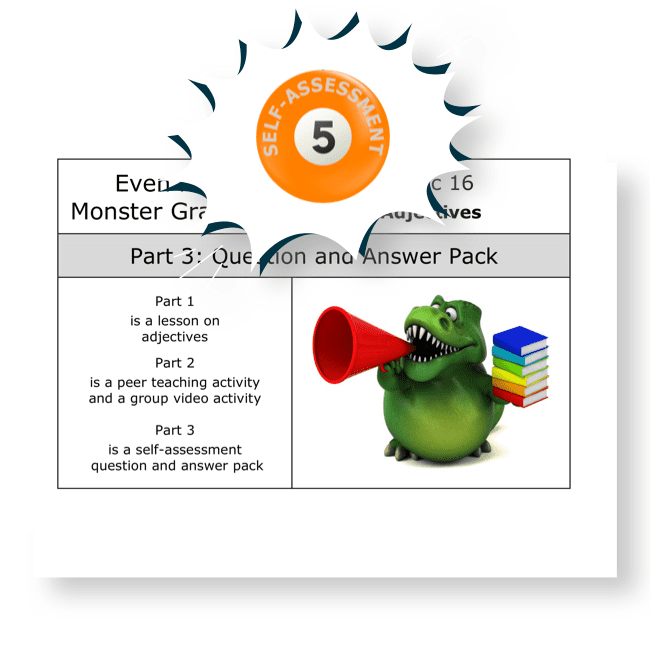 £1.00Add to basket
£1.00Add to basketHaving made notes with a partner (part 1) and experienced peer teaching (and peer learning) and making a video (part 2) in a group of four pupils should now be ready to work on their own. After answering the questions pupils then self-assess their work. The idea is to check that pupils’ individual understanding of Adjectives is secure. After completing this question and answer self-assessment unit pupils are in a position to see whether they are a purple monster (peer learner) or a green monster (peer teacher) of this topic. Purple monsters should be encouraged to watch videos on this topic.
VIEW -


Comparative & Superlative Adjectives English Grammar Lesson
£1.00 Add to basket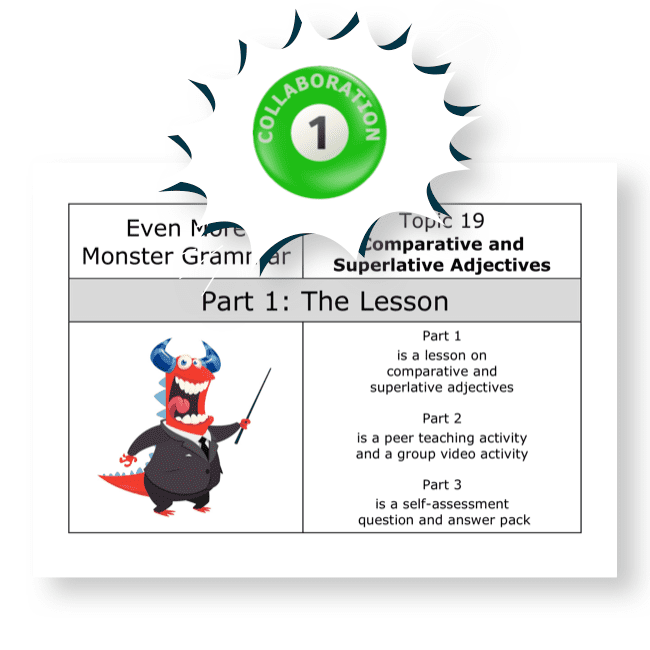 £1.00Add to basket
£1.00Add to basketIn this lesson pupils work with a partner to make some brief notes about Comparative and Superlative Adjectives. Ideally, pupils should make a note of only the essential aspects of this topic – say 5-6 main points (with examples). These notes are important because they will be used as a basis for peer teaching and making a video on this topic in part 2. This lesson has been written to enable to enable pupils to teach themselves without teacher input because each page has been carefully designed to nudge pupils’ learning forward.
VIEW -


Comparative & Superlative Adjectives Peer Teaching
£1.00 Add to basket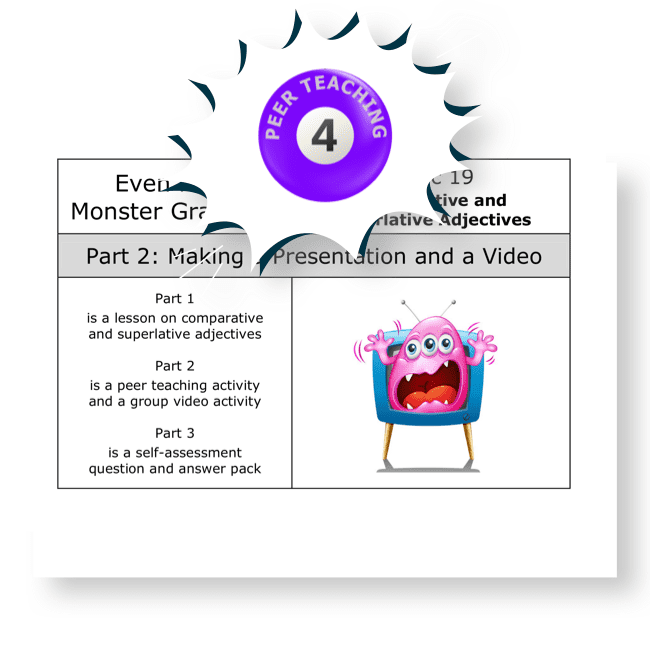 £1.00Add to basket
£1.00Add to basketWorking with a partner, pupils made brief notes on Comparative and Superlative Adjectives in part 1. The same pair should now be ready to make a presentation on this topic to another pair. In return this other pair will also make a presentation (on the same topic) back to them. In this process, all four pupils experience peer teaching and being peer taught thereby creating four “experts”. There is a suggested page of notes included in this part for pupils to check their own notes against before they peer teach this topic to each other. These four experts then combine the best bits of both of their presentations to create a short video about Comparative and Superlative Adjectives. This video will form part of a library of grammar topics to be shared among the class.
VIEW -


Comparative & Superlative Adjectives Self-Assessment
£1.00 Add to basket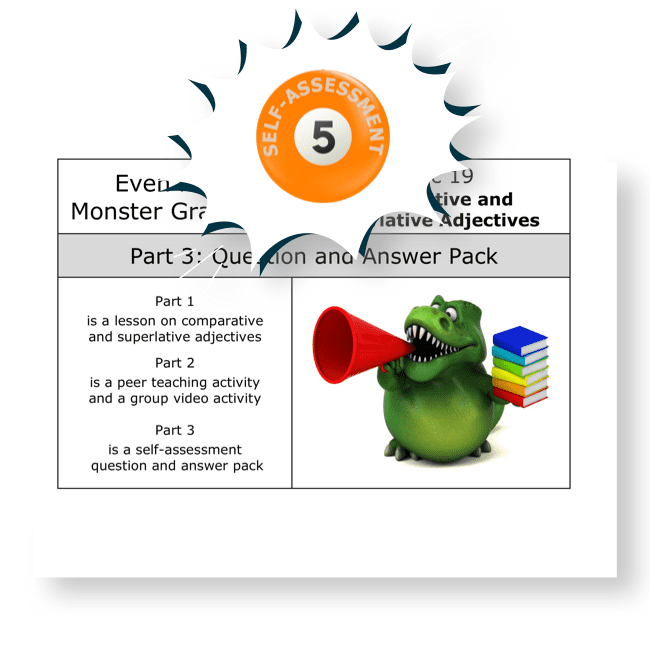 £1.00Add to basket
£1.00Add to basketHaving made notes with a partner (part 1) and experienced peer teaching (and peer learning) and making a video (part 2) in a group of four pupils should now be ready to work on their own. After answering the questions pupils then self-assess their work. The idea is to check that pupils’ individual understanding of Comparative and Superlative Adjectives is secure. After completing this question and answer self-assessment unit pupils are in a position to see whether they are a purple monster (peer learner) or a green monster (peer teacher) of this topic. Purple monsters should be encouraged to watch videos on this topic.
VIEW -
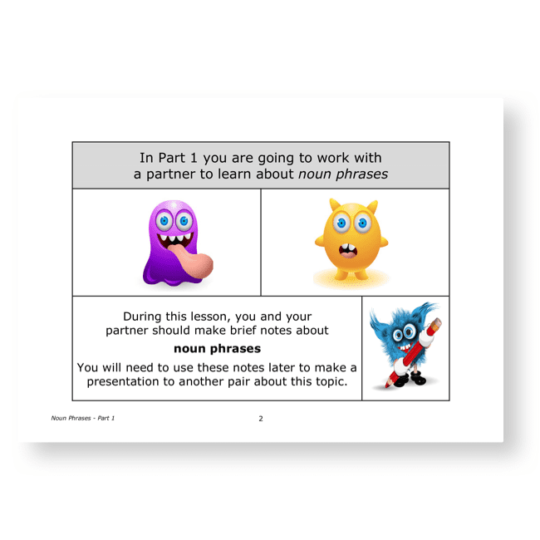
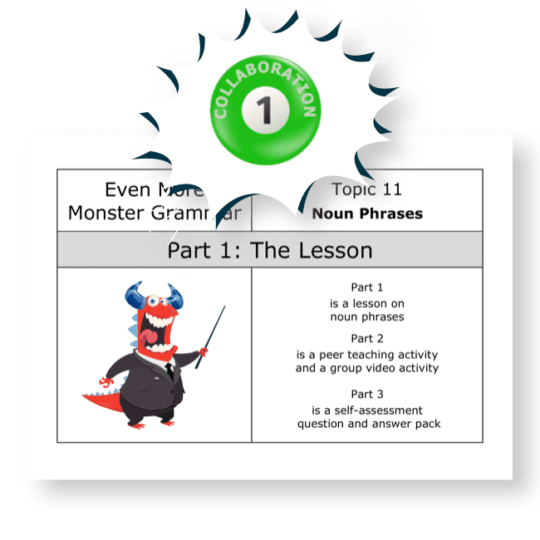
Noun Phrases English Grammar Lesson
£1.00 Add to basket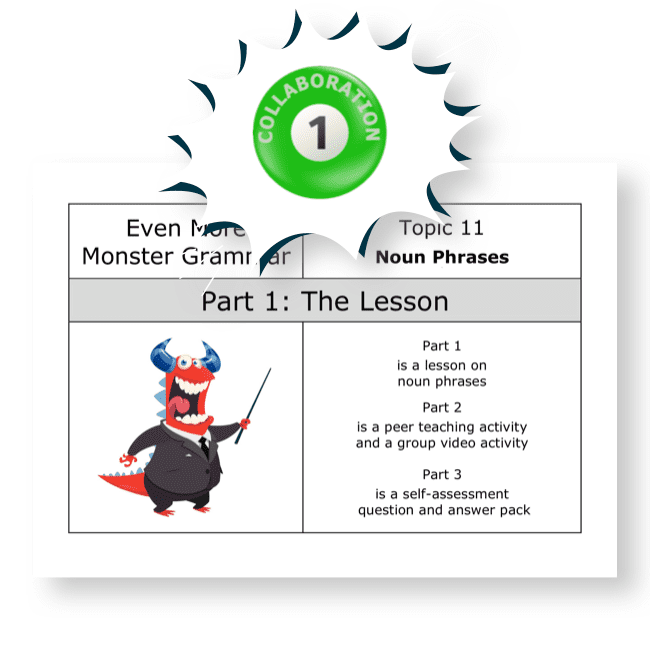 £1.00Add to basket
£1.00Add to basketIn this lesson pupils work with a partner to make some brief notes about Noun Phrases. Ideally, pupils should make a note of only the essential aspects of this topic – say 5-6 main points (with examples). These notes are important because they will be used as a basis for peer teaching and making a video on this topic in part 2. This lesson has been written to enable to enable pupils to teach themselves without teacher input because each page has been carefully designed to nudge pupils’ learning forward.
VIEW -


Noun Phrases Peer Teaching
£1.00 Add to basket £1.00Add to basket
£1.00Add to basketWorking with a partner, pupils made brief notes on Noun Phrases in part 1. The same pair should now be ready to make a presentation on this topic to another pair. In return this other pair will also make a presentation (on the same topic) back to them. In this process, all four pupils experience peer teaching and being peer taught thereby creating four “experts”. There is a suggested page of notes included in this part for pupils to check their own notes against before they peer teach this topic to each other. These four experts then combine the best bits of both of their presentations to create a short video about Noun Phrases. This video will form part of a library of grammar topics to be shared among the class.
VIEW -


Noun Phrases Self-Assessment
£1.00 Add to basket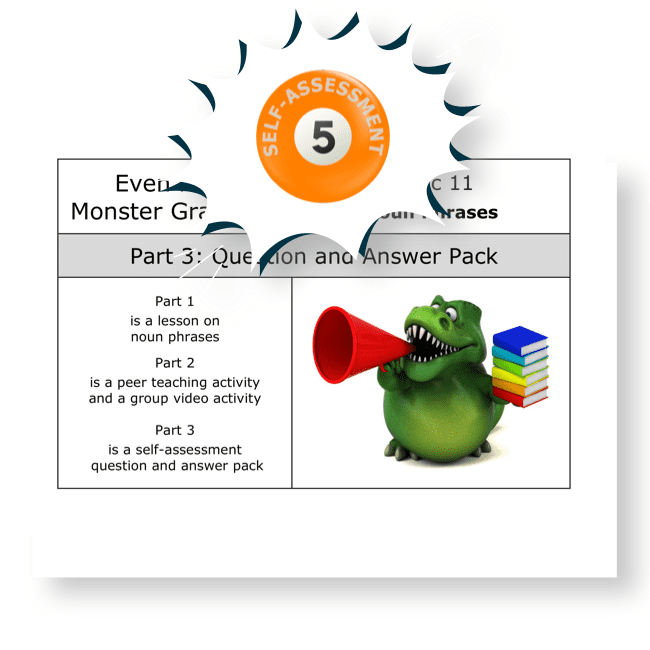 £1.00Add to basket
£1.00Add to basketHaving made notes with a partner (part 1) and experienced peer teaching (and peer learning) and making a video (part 2) in a group of four pupils should now be ready to work on their own. After answering the questions pupils then self-assess their own work. The idea is to check that pupils’ individual understanding of Noun Phrases is secure. After completing this question and answer self-assessment unit pupils are in a position to see whether they are a purple monster (peer learner) or a green monster (peer teacher) of this topic. Purple monsters should be encouraged to watch videos on this topic.
VIEW -
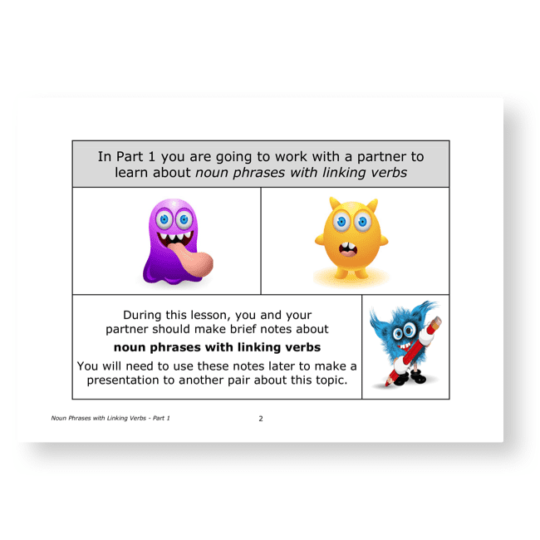

Noun Phrases with Linking Verbs English Grammar Lesson
£1.00 Add to basket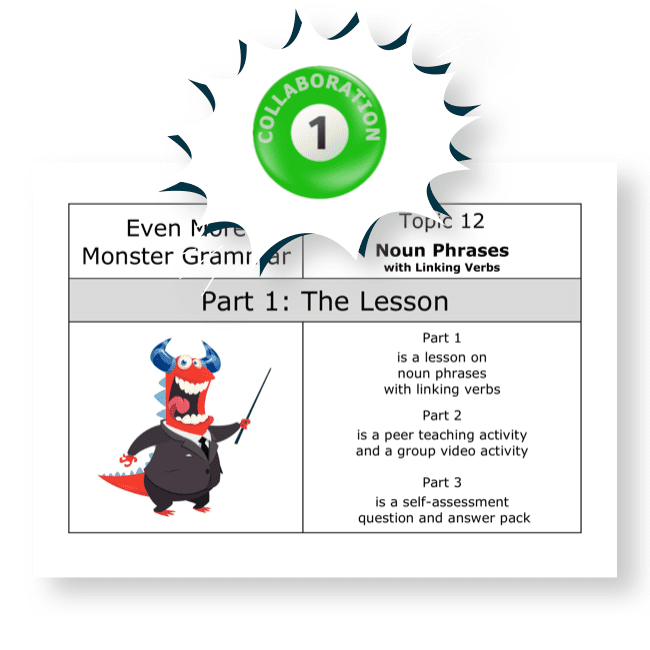 £1.00Add to basket
£1.00Add to basketIn this lesson pupils work with a partner to make some brief notes about Noun Phrases with Linking Verbs. Ideally, pupils should make a note of only the essential aspects of this topic – say 5-6 main points (with examples). These notes are important because they will be used as a basis for peer teaching and making a video on this topic in part 2. This lesson has been written to enable to enable pupils to teach themselves without teacher input because each page has been carefully designed to nudge pupils’ learning forward.
VIEW -
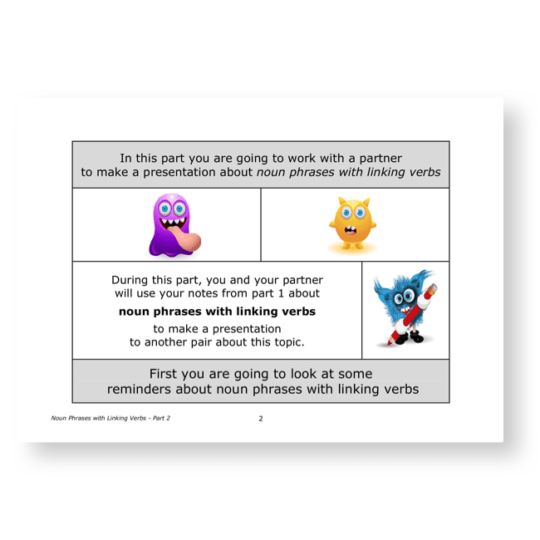

Noun Phrases with Linking Verbs Peer Teaching
£1.00 Add to basket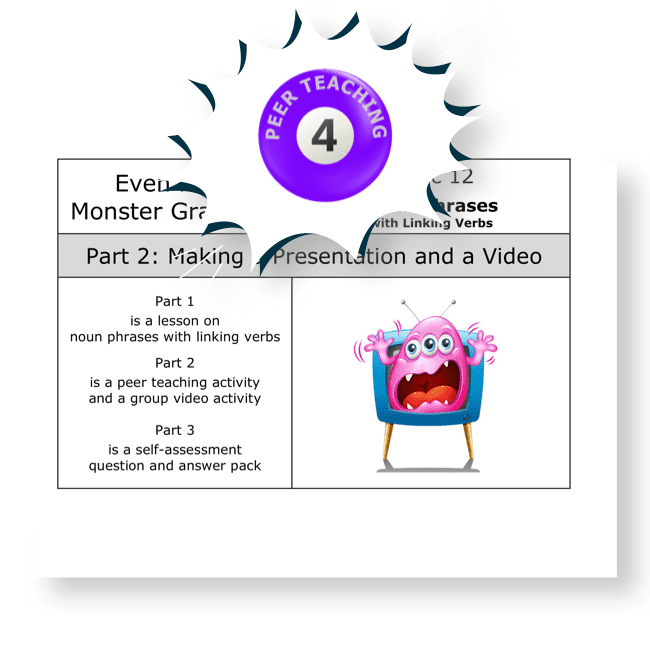 £1.00Add to basket
£1.00Add to basketWorking with a partner, pupils made brief notes on Noun Phrases with Linking Verbs in part 1. The same pair should now be ready to make a presentation on this topic to another pair. In return this other pair will also make a presentation (on the same topic) back to them. In this process, all four pupils experience peer teaching and being peer taught thereby creating four “experts”. There is a suggested page of notes included in this part for pupils to check their own notes against before they peer teach this topic to each other. These four experts then combine the best bits of both of their presentations to create a short video about Noun Phrases with Linking Verbs. This video will form part of a library of grammar topics to be shared among the class.
VIEW -
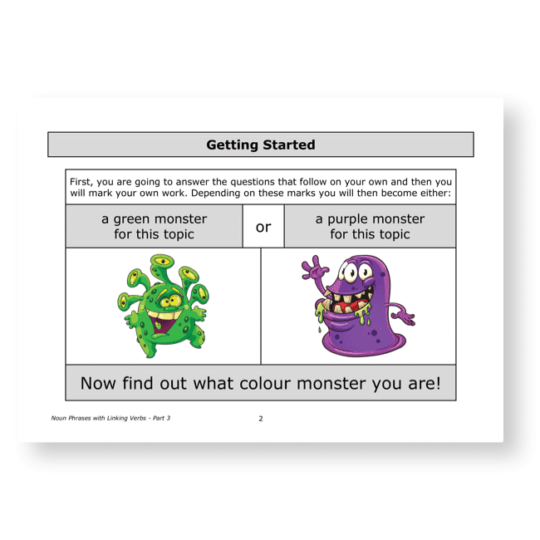
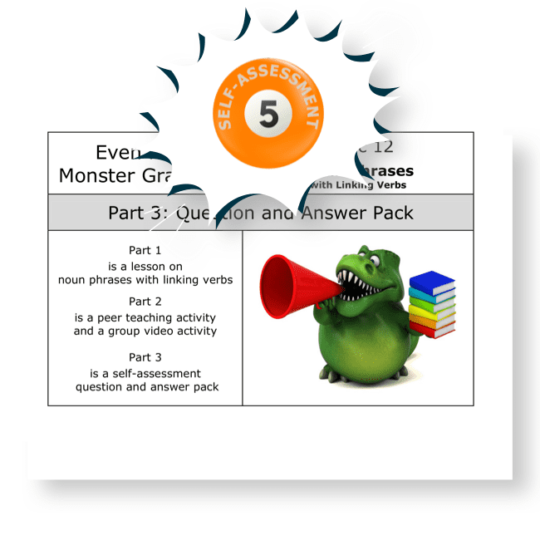
Noun Phrases with Linking Verbs Self-Assessment
£1.00 Add to basket £1.00Add to basket
£1.00Add to basketHaving made notes with a partner (part 1) and experienced peer teaching (and peer learning) and making a video (part 2) in a group of four pupils should now be ready to work on their own. After answering the questions pupils then self-assess their work. The idea is to check that pupils’ individual understanding of Noun Phrases with Linking Verbs is secure. After completing this question and answer self-assessment unit pupils are in a position to see whether they are a purple monster (peer learner) or a green monster (peer teacher) of this topic. Purple monsters should be encouraged to watch videos on this topic.
VIEW -
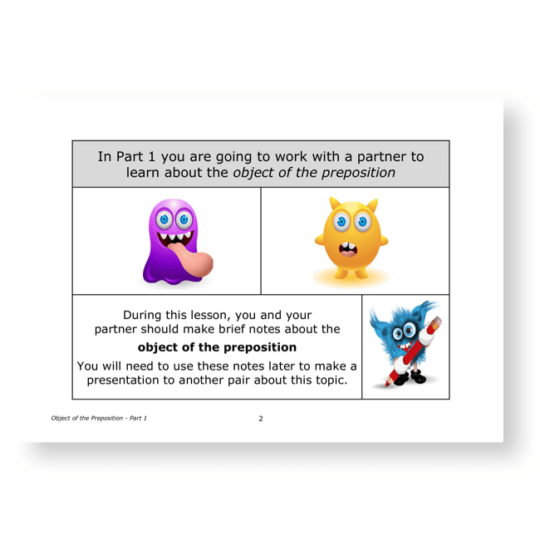
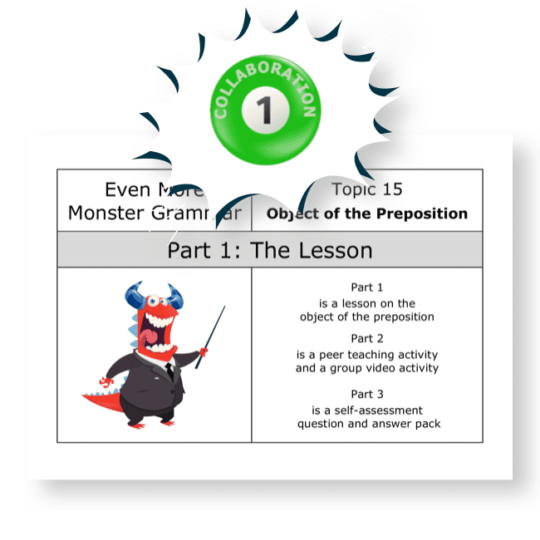
Object of the Preposition English Grammar Lesson
£1.00 Add to basket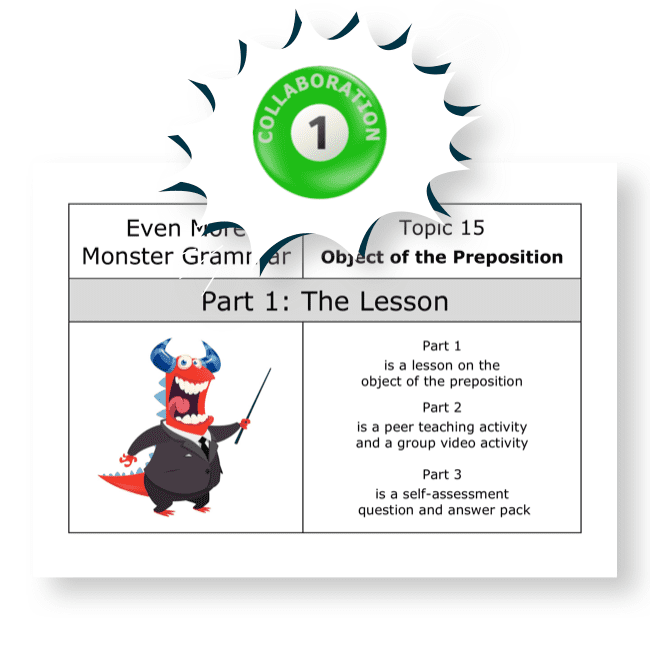 £1.00Add to basket
£1.00Add to basketIn this lesson pupils work with a partner to make some brief notes about the Object of the Preposition. Ideally, pupils should make a note of only the essential aspects of this topic – say 5-6 main points (with examples). These notes are important because they will be used as a basis for peer teaching and making a video on this topic in part 2. This lesson has been written to enable to enable pupils to teach themselves without teacher input because each page has been carefully designed to nudge pupils’ learning forward.
VIEW -


Object of the Preposition Self-Assessment
£1.00 Add to basket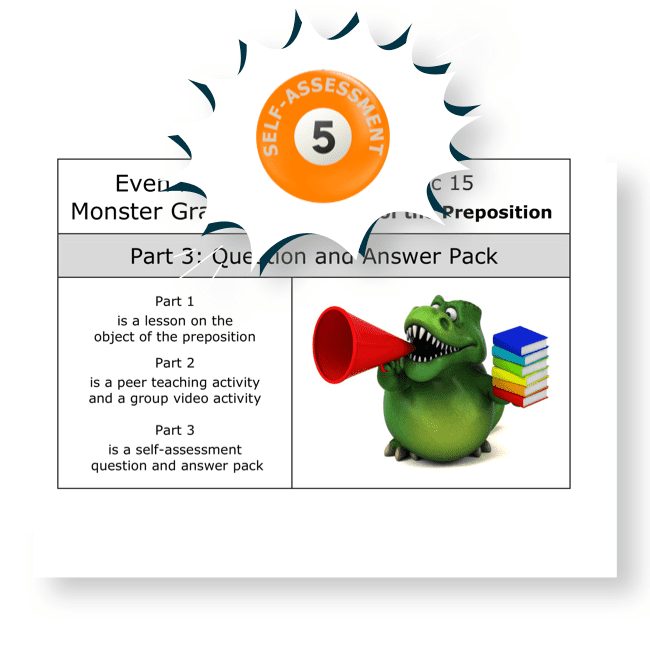 £1.00Add to basket
£1.00Add to basketHaving made notes with a partner (part 1) and experienced peer teaching (and peer learning) and making a video (part 2) in a group of four pupils should now be ready to work on their own. After answering the questions pupils then self-assess their work. The idea is to check that pupils’ individual understanding of the Object of the Preposition is secure After completing this question and answer self-assessment unit pupils are in a position to see whether they are a purple monster (peer learner) or a green monster (peer teacher) of this topic. Purple monsters should be encouraged to watch videos on this topic.
VIEW -

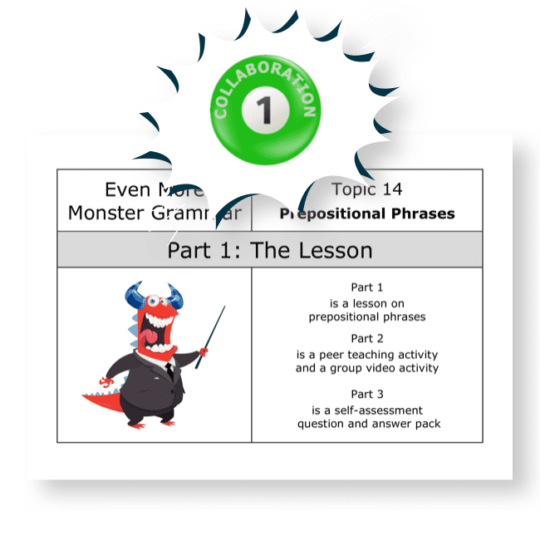
Prepositional Phrases English Grammar Lesson
£1.00 Add to basket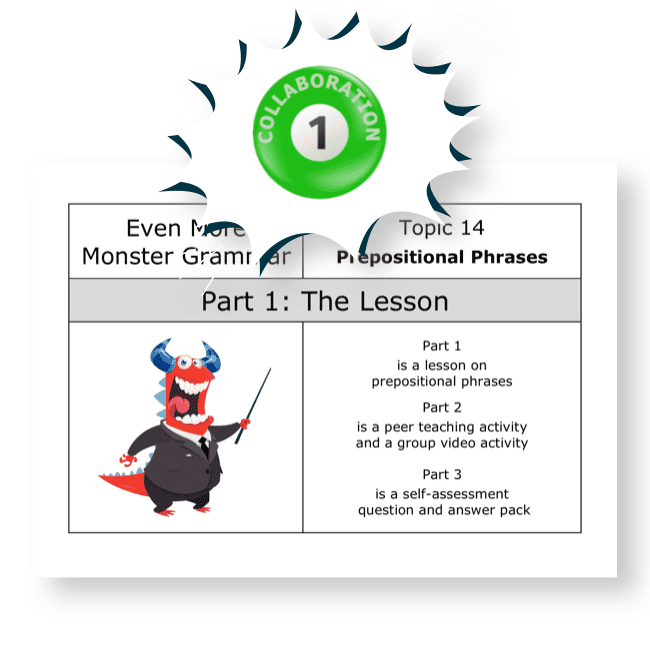 £1.00Add to basket
£1.00Add to basketIn this lesson pupils work with a partner to make some brief notes about Prepositional Phrases. Ideally, pupils should make a note of only the essential aspects of this topic – say 5-6 main points (with examples). These notes are important because they will be used as a basis for peer teaching and making a video on this topic in part 2. This lesson has been written to enable to enable pupils to teach themselves without teacher input because each page has been carefully designed to nudge pupils’ learning forward.
VIEW -


Prepositional Phrases Peer Teaching
£1.00 Add to basket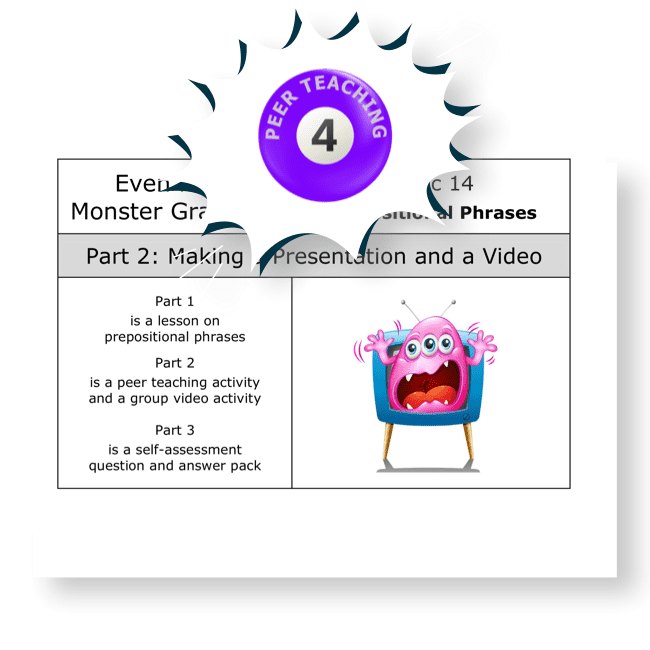 £1.00Add to basket
£1.00Add to basketWorking with a partner, pupils made brief notes on Prepositional Phrases in part 1. The same pair should now be ready to make a presentation on this topic to another pair. In return this other pair will also make a presentation (on the same topic) back to them. In this process, all four pupils experience peer teaching and being peer taught thereby creating four “experts”. There is a suggested page of notes included in this part for pupils to check their own notes against before they peer teach this topic to each other. These four experts then combine the best bits of both of their presentations to create a short video about Prepositional Phrases. This video will form part of a library of grammar topics to be shared among the class.
VIEW -


Prepositional Phrases Self-Assessment
£1.00 Add to basket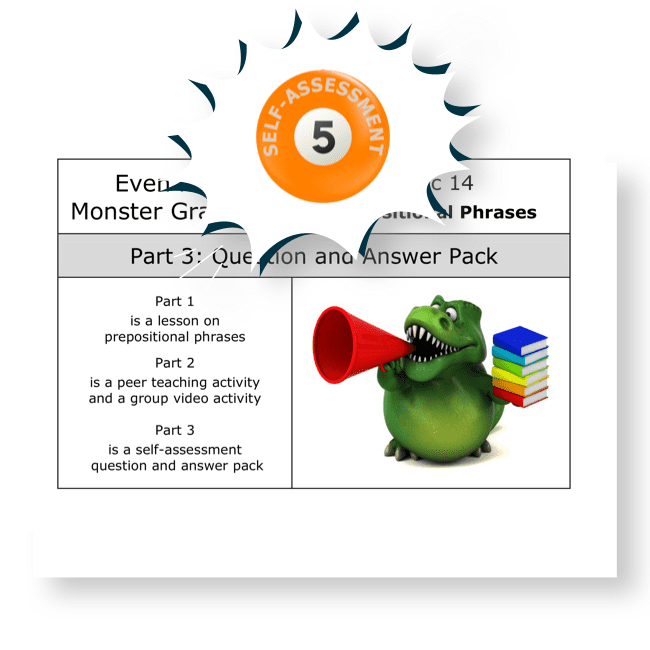 £1.00Add to basket
£1.00Add to basketHaving made notes with a partner (part 1) and experienced peer teaching (and peer learning) and making a video (part 2) in a group of four pupils should now be ready to work on their own. After answering the questions pupils then self-assess their work. The idea is to check that pupils’ individual understanding of Prepositional Phrases is secure. After completing this question and answer self-assessment unit pupils are in a position to see whether they are a purple monster (peer learner) or a green monster (peer teacher) of this topic. Purple monsters should be encouraged to watch videos on this topic.
VIEW -


Prepositions English Grammar Lesson
£1.00 Add to basket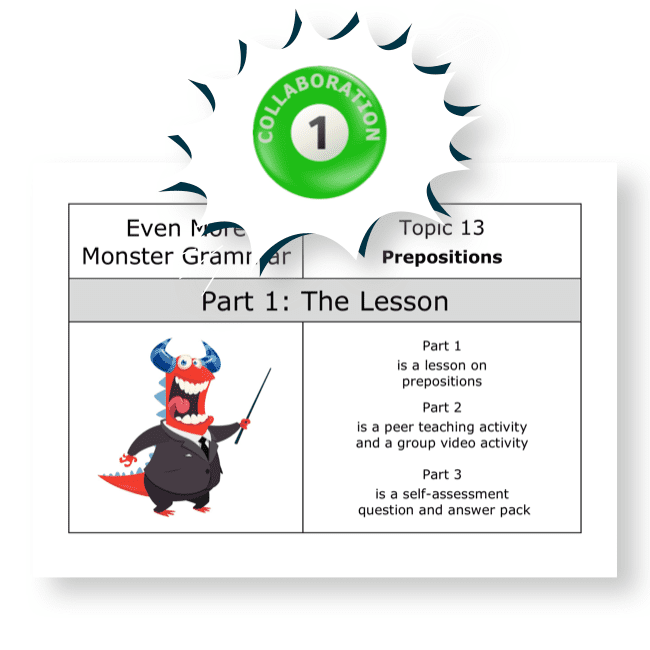 £1.00Add to basket
£1.00Add to basketIn this lesson pupils work with a partner to make some brief notes about Prepositions. Ideally, pupils should make a note of only the essential aspects of this topic – say 5-6 main points (with examples). These notes are important because they will be used as a basis for peer teaching and making a video on this topic in part 2. This lesson has been written to enable to enable pupils to teach themselves without teacher input because each page has been carefully designed to nudge pupils’ learning forward.
VIEW -
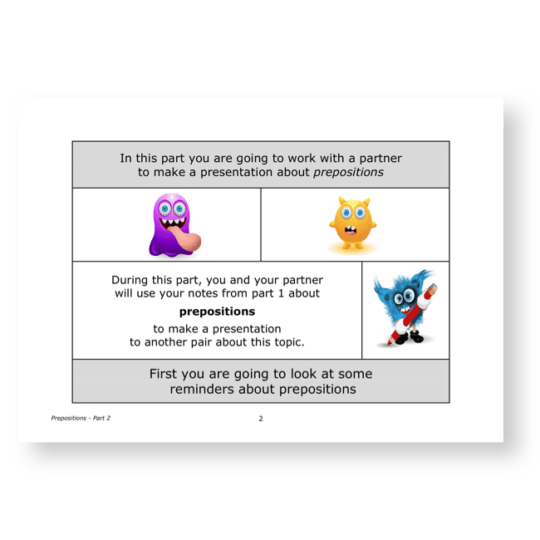
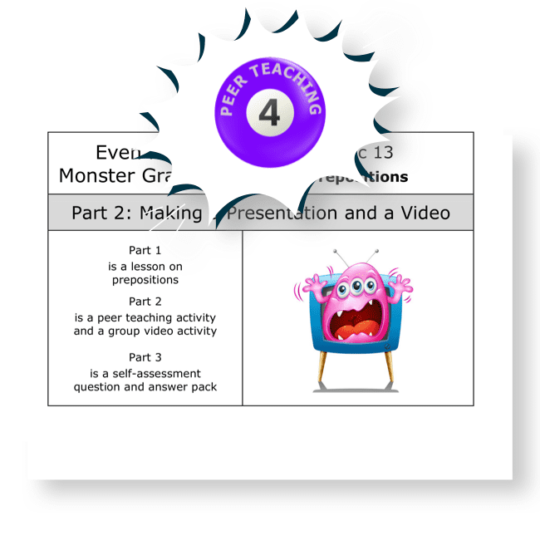
Prepositions Peer Teaching
£1.00 Add to basket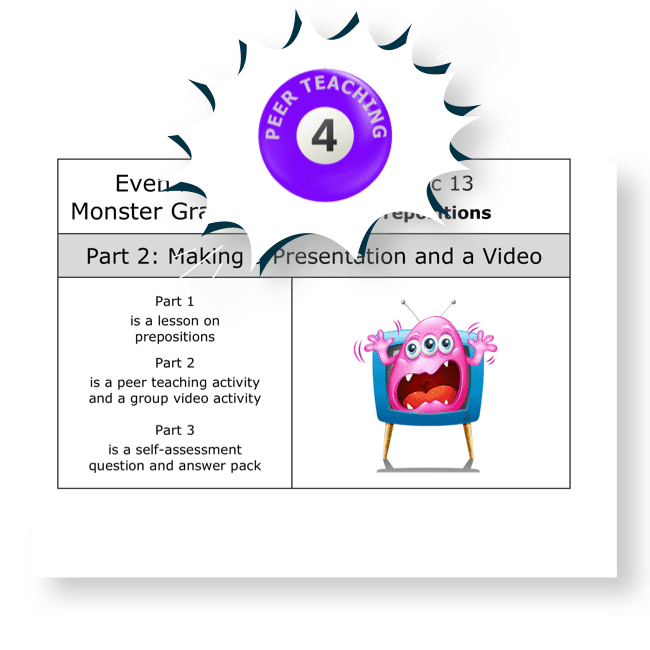 £1.00Add to basket
£1.00Add to basketWorking with a partner, pupils made brief notes on Prepositions in part 1. The same pair should now be ready to make a presentation on this topic to another pair. In return this other pair will also make a presentation (on the same topic) back to them. In this process, all four pupils experience peer teaching and being peer taught thereby creating four “experts”. There is a suggested page of notes included in this part for pupils to check their own notes against before they peer teach this topic to each other.
These four experts then combine the best bits of both of their presentations to create a short video about Prepositions. This video will form part of a library of grammar topics to be shared among the class.
VIEW -
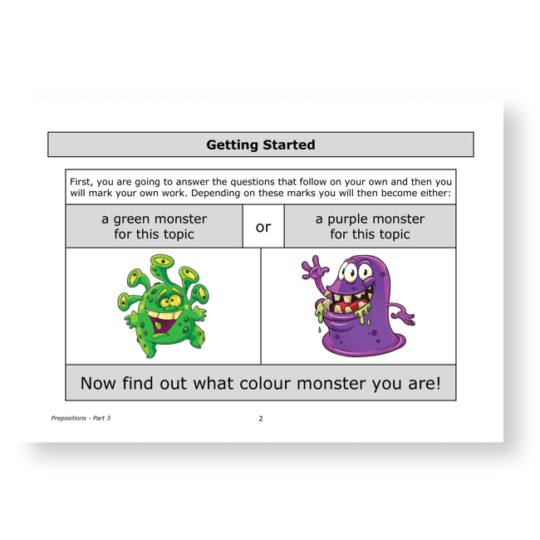
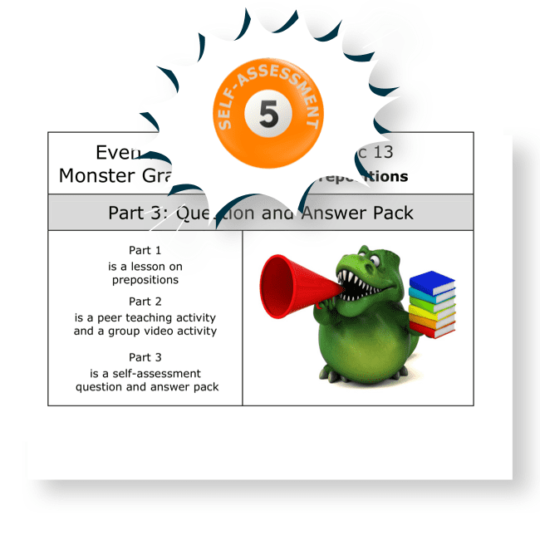
Prepositions Self-Assessment
£1.00 Add to basket £1.00Add to basket
£1.00Add to basketHaving made notes with a partner (part 1) and experienced peer teaching (and peer learning) and making a video (part 2) in a group of four pupils should now be ready to work on their own. After answering the questions pupils then self-assess their work. The idea is to check that pupils’ individual understanding of Prepositions is secure. After completing this question and answer self-assessment unit pupils are in a position to see whether they are a purple monster (peer learner) or a green monster (peer teacher) of this topic. Purple monsters should be encouraged to watch videos on this topic.
VIEW -

 SAVE 25%
SAVE 25%Even More Monster Grammar + PDF
£22.00 Add to basket £22.00Add to basket
£22.00Add to basketSave 25% when you buy all 30 lessons in this series:
P1. Noun Phrases: Lesson
P2. Noun Phrases: Presentation
P3. Noun Phrases: Q & A
P1. Noun Phrases LV: Lesson
P2. Noun Phrases LV: Presentation
P3. Noun Phrases LV: Q & A
P1. Prepositions: Lesson
P2. Prepositions: Presentation
P3. Prepositions: Q & A
P1. Prepositional Phrases: Lesson
P2. Prepositional Phrases: Presentation
P3. Prepositional Phrases: Q & A
P1. Obj of Prep: Lesson
P2. Obj of Prep: Presentation
P3. Obj of Prep: Q & A
P1. Adjectives: Lesson
P2. Adjectives: Presentation
P3. Adjectives: Q & A
P1. Nouns as Adjectives: Lesson
P2. Nouns as Adjectives: Presentation
P3. Nouns as Adjectives: Q & A
P1. Adjectival Phrases: Lesson
P2. Adjectival Phrases: Presentation
P3. Adjectival Phrases: Q & A
P1. Comp & Super: Lesson
P2. Comp & Super: Presentation
P3. Comp & Super: Q & A
P1. Verbs as Adj: Lesson
P2. Verbs as Adj: Presentation
P3. Verbs as Adj: Q & AVIEW -


The Object of the Preposition Peer Teaching
£1.00 Add to basket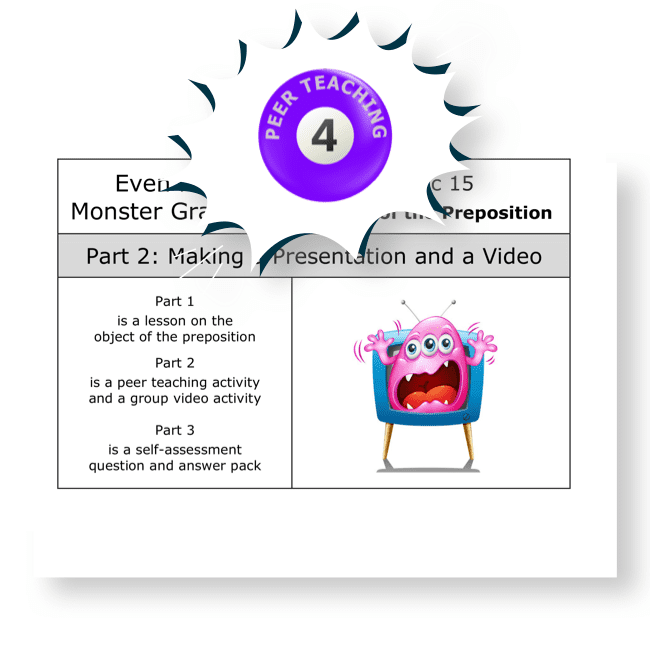 £1.00Add to basket
£1.00Add to basketWorking with a partner, pupils made brief notes on the Object of the Preposition in part 1. The same pair should now be ready to make a presentation on this topic to another pair. In return this other pair will also make a presentation (on the same topic) back to them. In this process, all four pupils experience peer teaching and being peer taught thereby creating four “experts”. There is a suggested page of notes included in this part for pupils to check their own notes against before they peer teach this topic to each other. These four experts then combine the best bits of both of their presentations to create a short video about the Object of the Preposition. This video will form part of a library of grammar topics to be shared among the class.
VIEW -


Using Nouns as Adjectives English Grammar Lesson
£1.00 Add to basket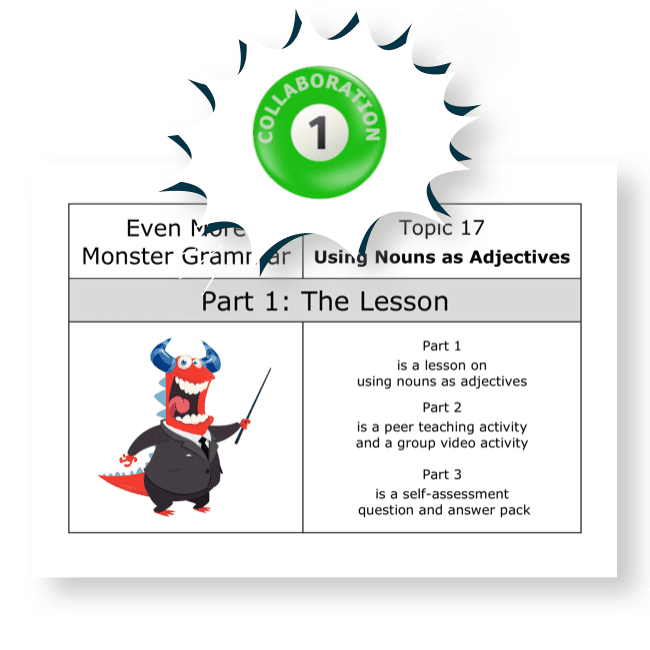 £1.00Add to basket
£1.00Add to basketIn this lesson pupils work with a partner to make some brief notes about Using Nouns as Adjectives. Ideally, pupils should make a note of only the essential aspects of this topic – say 5-6 main points (with examples). These notes are important because they will be used as a basis for peer teaching and making a video on this topic in part 2. This lesson has been written to enable to enable pupils to teach themselves without teacher input because each page has been carefully designed to nudge pupils’ learning forward.
VIEW -


Using Nouns as Adjectives Peer Teaching
£1.00 Add to basket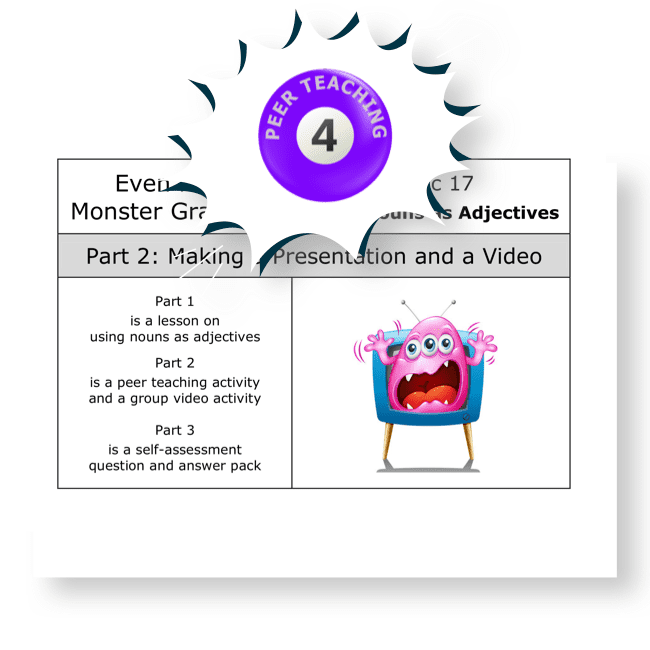 £1.00Add to basket
£1.00Add to basketWorking with a partner, pupils made brief notes on Using Nouns as Adjectives in part 1. The same pair should now be ready to make a presentation on this topic to another pair. In return this other pair will also make a presentation (on the same topic) back to them. In this process, all four pupils experience peer teaching and being peer taught thereby creating four “experts”. There is a suggested page of notes included in this part for pupils to check their own notes against before they peer teach this topic to each other. These four experts then combine the best bits of both of their presentations to create a short video about Using Nouns as Adjectives. This video will form part of a library of grammar topics to be shared among the class.
VIEW -


Using Nouns as Adjectives Self-Assessment
£1.00 Add to basket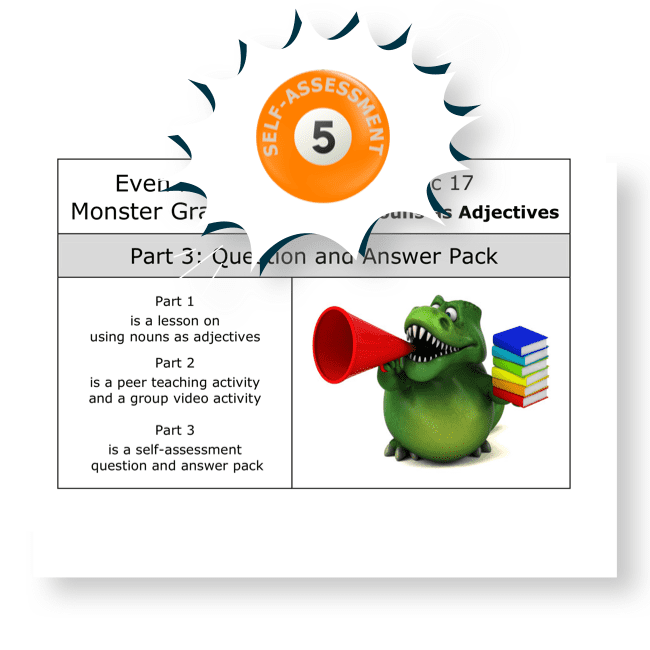 £1.00Add to basket
£1.00Add to basketHaving made notes with a partner (part 1) and experienced peer teaching (and peer learning) and making a video (part 2) in a group of four pupils should now be ready to work on their own. After answering the questions pupils then self-assess their work. The idea is to check that pupils’ individual understanding of Using Nouns as Adjectives is secure. After completing this question and answer self-assessment unit pupils are in a position to see whether they are a purple monster (peer learner) or a green monster (peer teacher) of this topic. Purple monsters should be encouraged to watch videos on this topic.
VIEW -


Using Verbs as Adjectives English Grammar Lesson
£1.00 Add to basket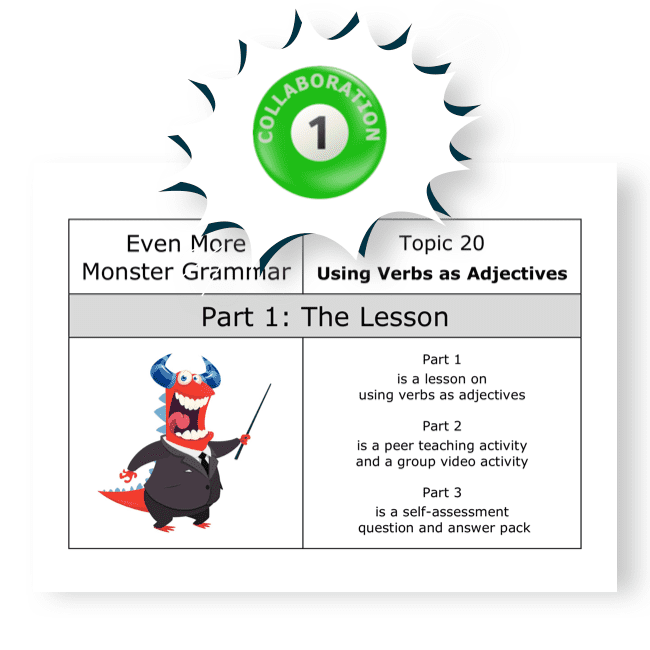 £1.00Add to basket
£1.00Add to basketIn this lesson pupils work with a partner to make some brief notes about Using Verbs as Adjectives. Ideally, pupils should make a note of only the essential aspects of this topic – say 5-6 main points (with examples). These notes are important because they will be used as a basis for peer teaching and making a video on this topic in part 2. This lesson has been written to enable to enable pupils to teach themselves without teacher input because each page has been carefully designed to nudge pupils’ learning forward.
VIEW -


Using Verbs as Adjectives Peer Teaching
£1.00 Add to basket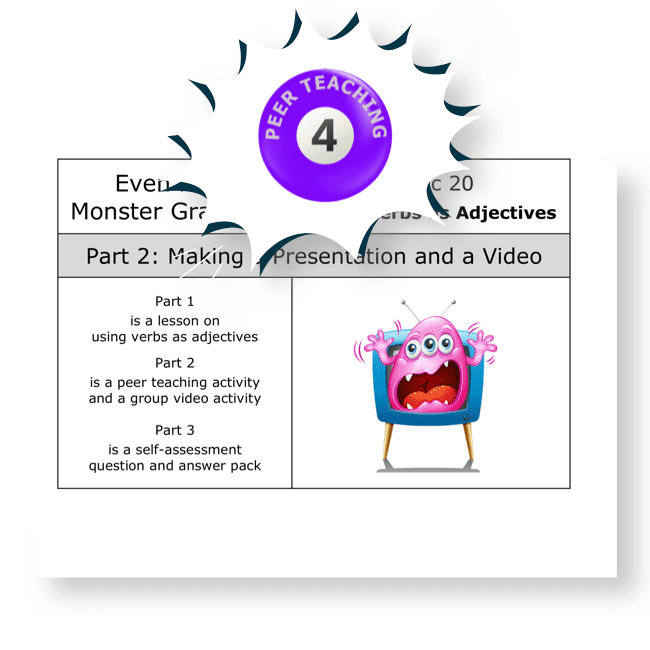 £1.00Add to basket
£1.00Add to basketWorking with a partner, pupils made brief notes on Using Verbs as Adjectives in part 1. The same pair should now be ready to make a presentation on this topic to another pair. In return this other pair will also make a presentation (on the same topic) back to them. In this process, all four pupils experience peer teaching and being peer taught thereby creating four “experts”. There is a suggested page of notes included in this part for pupils to check their own notes against before they peer teach this topic to each other. These four experts then combine the best bits of both of their presentations to create a short video about Using Verbs as Adjectives. This video will form part of a library of grammar topics to be shared among the class.
VIEW -


Using Verbs as Adjectives Self-Assessment
£1.00 Add to basket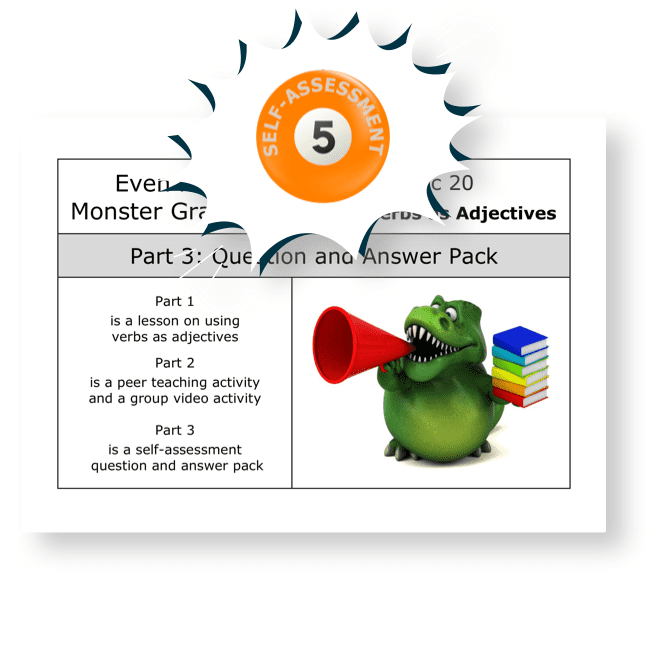 £1.00Add to basket
£1.00Add to basketHaving made notes with a partner (part 1) and experienced peer teaching (and peer learning) and making a video (part 2) in a group of four pupils should now be ready to work on their own. After answering the questions pupils then self-assess their work. The idea is to check that pupils’ individual understanding of Using Verbs as Adjectives is secure. After completing this question and answer self-assessment unit pupils are in a position to see whether they are a purple monster (peer learner) or a green monster (peer teacher) of this topic. Purple monsters should be encouraged to watch videos on this topic.
VIEW
